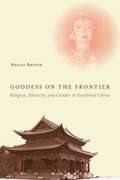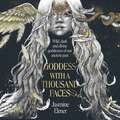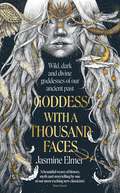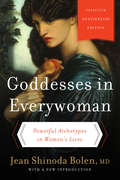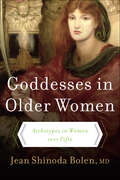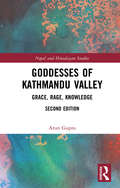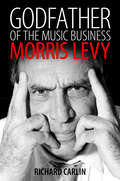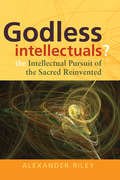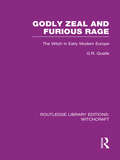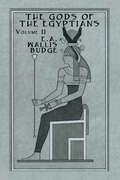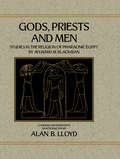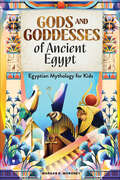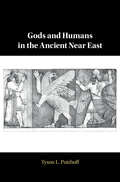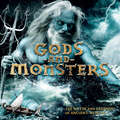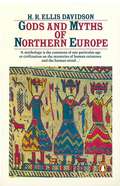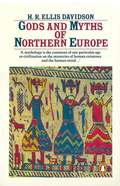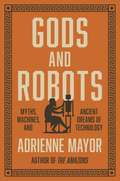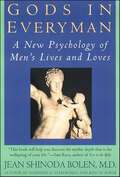- Table View
- List View
Goddess on the Frontier: Religion, Ethnicity, and Gender in Southwest China
by Megan BrysonDali is a small region on a high plateau in Southeast Asia. Its main deity, Baijie, has assumed several gendered forms throughout the area's history: Buddhist goddess, the mother of Dali's founder, a widowed martyr, and a village divinity. What accounts for so many different incarnations of a local deity? Goddess on the Frontier argues that Dali's encounters with forces beyond region and nation have influenced the goddess's transformations. Dali sits at the cultural crossroads of Southeast Asia, India, and Tibet; it has been claimed by different countries but is currently part of Yunnan Province in Southwest China. Megan Bryson incorporates historical-textual studies, art history, and ethnography in her book to argue that Baijie provided a regional identity that enabled Dali to position itself geopolitically and historically. In doing so, Bryson provides a case study of how people craft local identities out of disparate cultural elements and how these local identities transform over time in relation to larger historical changes--including the increasing presence of the Chinese state.
Goddess with a Thousand Faces: A one-of-a-kind exploration of goddesses from our ancient past
by Jasmine Elmer'I loved Goddess with a Thousand Faces. Fascinating, fun and thoughtful and enlightening' JENNIFER SAINT'A beautiful weave of history, myth and storytelling by one of our most exciting new classicists' DAN SNOWSteeped in ancient magic, dark divinity and wild ways, Goddess with a Thousand Faces takes you on a historical journey like no other...Blending mythological retellings with historical research, Goddess with a Thousand Faces traverses the world and transports through time to bring ten formidable and inspiring ancient goddesses to life. Meet Artemis, the Greek goddess of the wilderness, never without her bow and arrow; Sedna, Inuit goddess of the ocean, guarding the icy waters and all its creatures; Isis, Egyptian goddess of healing, who dwells by the River Nile, just to name a few...Jasmine Elmer explores these goddesses of our past, uncovering their truths, their rebellion and their freedom. For too long, they have been written out of history; lost to the sands of time and stamped into silence. Goddess with a Thousand Faces restores these women to their glory. Pour over this treasure trove of myths, legends and mighty goddesses. Hear the messages echoing through the ages and see yourself in the faces of these icons. For while their stories might ancient, today they are more important - and more powerful - than ever.A treasure trove of beautiful storytelling and ancient wisdom, perfect for fans of Love in Colour by Bolu Babalola and Storyland by Amy Jeffs.'Gorgeous. Jasmine Elmer has a fierce passion for these women, and this shines through in her writing. Come for the goddesses, stay for the spiritual journey!' Lizzy Tiffin, author of Bad Girls of Ancient Greece'If you love history and feminist retellings, this is your next must-read. Goddess With a Thousand Faces is a thrilling exploration of lesser-known goddesses from around the world - offering a crash course in feminine myth and worship, with all its power, fury and wonder. I adored it' Rachel Blackmore, author of Costanza'A passionate ode to the inner goddess within us all, that blends a rich and vibrant introduction to a diverse array of cultures and mythologies with accessible retellings. Part mythical guide, part history compendium and part self-help handbook, Jasmine Elmer's sparkling debut offers up a refreshing, inclusive and powerfully feminist manifesto for what it means to be a goddess, ancient and modern' Emily Hauser, author of Mythica
Goddess with a Thousand Faces: A one-of-a-kind exploration of goddesses from our ancient past
by Jasmine Elmer'I loved Goddess with a Thousand Faces. Fascinating, fun and thoughtful and enlightening' JENNIFER SAINT'A beautiful weave of history, myth and storytelling by one of our most exciting new classicists' DAN SNOWSteeped in ancient magic, dark divinity and wild ways, Goddess with a Thousand Faces takes you on a historical journey like no other...Blending mythological retellings with historical research, Goddess with a Thousand Faces traverses the world and transports through time to bring ten formidable and inspiring ancient goddesses to life. Meet Artemis, the Greek goddess of the wilderness, never without her bow and arrow; Sedna, Inuit goddess of the ocean, guarding the icy waters and all its creatures; Isis, Egyptian goddess of healing, who dwells by the River Nile, just to name a few...Jasmine Elmer explores these goddesses of our past, uncovering their truths, their rebellion and their freedom. For too long, they have been written out of history; lost to the sands of time and stamped into silence. Goddess with a Thousand Faces restores these women to their glory. Pour over this treasure trove of myths, legends and mighty goddesses. Hear the messages echoing through the ages and see yourself in the faces of these icons. For while their stories might ancient, today they are more important - and more powerful - than ever.A treasure trove of beautiful storytelling and ancient wisdom, perfect for fans of Love in Colour by Bolu Babalola and Storyland by Amy Jeffs.'Gorgeous. Jasmine Elmer has a fierce passion for these women, and this shines through in her writing. Come for the goddesses, stay for the spiritual journey!' Lizzy Tiffin, author of Bad Girls of Ancient Greece'If you love history and feminist retellings, this is your next must-read. Goddess With a Thousand Faces is a thrilling exploration of lesser-known goddesses from around the world - offering a crash course in feminine myth and worship, with all its power, fury and wonder. I adored it' Rachel Blackmore, author of Costanza'A passionate ode to the inner goddess within us all, that blends a rich and vibrant introduction to a diverse array of cultures and mythologies with accessible retellings. Part mythical guide, part history compendium and part self-help handbook, Jasmine Elmer's sparkling debut offers up a refreshing, inclusive and powerfully feminist manifesto for what it means to be a goddess, ancient and modern' Emily Hauser, author of Mythica
Goddess with a Thousand Faces: A one-of-a-kind exploration of goddesses from our ancient past
by Jasmine Elmer'I loved Goddess with a Thousand Faces. Fascinating, fun and thoughtful and enlightening' JENNIFER SAINT'A beautiful weave of history, myth and storytelling by one of our most exciting new classicists' DAN SNOWSteeped in ancient magic, dark divinity and wild ways, Goddess with a Thousand Faces takes you on a historical journey like no other...Blending mythological retellings with historical research, Goddess with a Thousand Faces traverses the world and transports through time to bring ten formidable and inspiring ancient goddesses to life. Meet Artemis, the Greek goddess of the wilderness, never without her bow and arrow; Sedna, Inuit goddess of the ocean, guarding the icy waters and all its creatures; Isis, Egyptian goddess of healing, who dwells by the River Nile, just to name a few...Jasmine Elmer explores these goddesses of our past, uncovering their truths, their rebellion and their freedom. For too long, they have been written out of history; lost to the sands of time and stamped into silence. Goddess with a Thousand Faces restores these women to their glory. Pour over this treasure trove of myths, legends and mighty goddesses. Hear the messages echoing through the ages and see yourself in the faces of these icons. For while their stories might ancient, today they are more important - and more powerful - than ever.A treasure trove of beautiful storytelling and ancient wisdom, perfect for fans of Love in Colour by Bolu Babalola and Storyland by Amy Jeffs.'Gorgeous. Jasmine Elmer has a fierce passion for these women, and this shines through in her writing. Come for the goddesses, stay for the spiritual journey!' Lizzy Tiffin, author of Bad Girls of Ancient Greece'If you love history and feminist retellings, this is your next must-read. Goddess With a Thousand Faces is a thrilling exploration of lesser-known goddesses from around the world - offering a crash course in feminine myth and worship, with all its power, fury and wonder. I adored it' Rachel Blackmore, author of Costanza'A passionate ode to the inner goddess within us all, that blends a rich and vibrant introduction to a diverse array of cultures and mythologies with accessible retellings. Part mythical guide, part history compendium and part self-help handbook, Jasmine Elmer's sparkling debut offers up a refreshing, inclusive and powerfully feminist manifesto for what it means to be a goddess, ancient and modern' Emily Hauser, author of Mythica
Goddesses in Everywoman: A New Psychology of Women
by Jean Shinoda BolenA classic work of female psychology that uses seven archetypcal goddesses as a way of describing behavior patterns and personality traits is being introduced to the next generation of readers with a new introduction by the author. Psychoanalyst Jean Bolen's career soared in the early 1980s when Goddesses in Everywoman was published. Thousands of women readers became fascinated with identifying their own inner goddesses and using these archetypes to guide themselves to greater self-esteem, creativity, and happiness. Bolen's radical idea was that just as women used to be unconscious of the powerful effects that cultural stereotypes had on them, they were also unconscious of powerful archetypal forces within them that influence what they do and how they feel, and which account for major differences among them. Bolen believes that an understanding of these inner patterns and their interrelationships offers reassuring, true-to-life alternatives that take women far beyond such restrictive dichotomies as masculine/feminine, mother/lover, careerist/housewife. And she demonstrates in this book how understanding them can provide the key to self-knowledge and wholeness. Dr. Bolen introduced these patterns in the guise of seven archetypal goddesses, or personality types, with whom all women could identify, from the autonomous Artemis and the cool Athena to the nurturing Demeter and the creative Aphrodite, and explains how to decide which to cultivate and which to overcome, and how to tap the power of these enduring archetypes to become a better "heroine" in one's own life story.
Goddesses in Older Women: Archetypes in Women Over Fifty
by Jean Shinoda BolenAt some point after fifty, every woman crosses a threshold into the third phase of her life. As she enters this uncharted territory -- one that is generally uncelebrated in popular culture -- she can choose to mourn what has gone before, or she can embrace the juicy-crone years.In this celebration of Act Three, Jean Shinoda Bolen, Jungian analyst and bestselling author of Goddesses in Everywoman, names the powerful new energies and potentials -- or archetypes -- that come into the psyche at this momentous time, suggesting that women getting older have profound and exciting reasons for welcoming the other side of fifty.
Goddesses of Kathmandu Valley: Grace, Rage, Knowledge (Nepal and Himalayan Studies)
by Arun GuptoIn South Asia goddesses are conceptualized and worshipped in a fascinatingrange of forms – from cosmic beings to bacterial manifestations, from human-like appearances to creatures with animal and insect semblances. This book maps the diverse identities of goddesses through metaphors of Grace, Rage and Knowledge, and offers an in-depth insight into femininity, sexual politics, ritual worship, religion, ecology and gender. The volume explores how these deity attributes are expressed and embedded through anthropomorphic as well as inorganic forms of nature: beautiful women, multi-legged and many-armed animals, epistemic selves, demonic beings, glamorous personifications and also grotesque sub-humans. The second edition contains an Epilogue which further explores how the discourses on Goddesses are moulded by the myth and folklore. It opens discussions on how the dynamism of Goddess cultures have been appropriated into contemporary variations of those archetypes over time. This book will be useful to scholars and researchers of religious studies, cultural studies, folklore, art, literature, sociology and gender studies, especially those interested in Nepal and Hinduism.
Godfather of the Music Business: Morris Levy (American Made Music Series)
by Richard CarlinAssociation of Recorded Sound Collections Awards for ExcellenceBest Historical Research in Record Labels – Best History (2017)This biography tells the story of one of the most notorious figures in the history of popular music, Morris Levy (1927-1990). At age nineteen, he cofounded the nightclub Birdland in Hell's Kitchen, which became the home for a new musical style, bebop. Levy operated one of the first integrated clubs on Broadway and helped build the careers of Dizzy Gillespie and Bud Powell and most notably aided the reemergence of Count Basie. In 1957, he founded a record label, Roulette Records. Roulette featured many of the significant jazz artists who played Birdland but also scored top pop hits with acts like Buddy Knox, Frankie Lymon and the Teenagers, Joey Dee and the Starliters, and, in the mid-1960s, Tommy James.Stories abound of Levy threatening artists, songwriters, and producers, sometimes just for the sport, other times so he could continue to build his empire. Along the way, Levy attracted "investors" with ties to the Mafia, including Dominic Ciaffone (a.k.a. "Swats" Mulligan), Tommy Eboli, and the most notorious of them all, Vincent Gigante. Gigante allegedly owned large pieces of Levy's recording and retail businesses.Starting in the late 1950s, the FBI and IRS investigated Levy but could not make anything stick until the early 1980s, when Levy foolishly got involved in a deal to sell remaindered records to a small-time reseller, John LaMonte. With partners in the mob, Levy tried to force LaMonte to pay for four million remaindered records. When the FBI secretly wiretapped LaMonte in an unrelated investigation and agents learned about the deal, investigators successfully prosecuted Levy in the extortion scheme. Convicted in 1988, Levy did not live to serve prison time. Stricken with cancer, he died just as his last appeals were exhausted. However, even if he had lived, Levy's brand of storied high life was effectively bust. Corporate ownership of record labels doomed most independents in the business, ending the days when a savvy if ruthless hustler could blaze a path to the top.
Godless Intellectuals?: The Intellectual Pursuit of the Sacred Reinvented (Berghahn Ser.)
by Alexander Tristan RileyThe Durkheimians have traditionally been understood as positivist, secular thinkers, fully within the Enlightenment project of limitless reason and progress. In a radical revision of this view, this book persuasively argues that the core members of the Durkheimian circle (Durkheim himself, Marcel Mauss, Henri Hubert and Robert Hertz) are significantly more complicated than this. Through his extensive analysis of large volumes of correspondence as well as historical and macro-sociological mappings of the intellectual and social worlds in which the Durkheimian project emerged, the author shows the Durkheimian project to have constituted a quasi-religious quest in ways much deeper than most interpreters have thought. Their fascination, both personal and intellectual, with the sacred is the basis on which the author reconstructs some important components of modern French intellectual history, connecting Durkheimian thought to key representatives of French poststructuralism and postmodernism: Bataille, Foucault, Derrida, Baudrillard, and Deleuze.
Godly Zeal and Furious Rage: The Witch in Early Modern Europe (Routledge Library Editions: Witchcraft)
by Geoffrey Robert QuaifeThough it is clearly an exceptionally important part of popular culture, witchcraft has generated a variety of often contradictory interpretations, starting from widely differing premises about the nature of witchcraft, its social role and the importance of higher theology as well as more popular beliefs. This work offers a conspectus of historical work on witchcraft in Europe, and shows how many trends converged to form the figure of the witch, and varied from one part of Europe to another.
Gods & Pharaohs from Egyptian Mythology (The World Mythology Series)
by Geraldine Harris"Beginning with a brief overview of the land and history and the importance of religion in the lives of the ancient Egyptians, Harris relates the fascinating stories told by the ancients: tales of the gods Ra, Osiris, Horus and Seth; the pharaohs Khufu, Zoser, Amonhotep and Rameses and of lesser gods and princes. The 18 large paintings and the many line drawings vividly portray the text. In addition, a series of notes at the end of the book further explains the symbolism shown in the drawings of the characters and events of the story. Fully indexed, and containing a brief description of hieroglyphic script as well... [it] is a valuable volume for inclusion in public and middle school libraries." - School Library journal
Gods Like Us
by Ty BurrWITH 8 PAGES OF BLACK-AND-WHITE PHOTOGRAPHSHow--and why--do we obsess over movie stars? How does fame both reflect and mask the person behind it? How have the image of stardom and our stars' images altered over a century of cultural and technological change? Do we create celebrities, or do they create us? Ty Burr, film critic for The Boston Globe, answers these questions in this lively and fascinating anecdotal history of stardom, with all its blessings and curses for star and stargazer alike. From Mary Pickford and Charlie Chaplin to Archie Leach (a.k.a. Cary Grant) and Marion Morrison (a.k.a. John Wayne), Tom Cruise and Julia Roberts, and such no-cal stars of today as the Kardashians and the new online celebrity (i.e., you and me), Burr takes us on an insightful and entertaining journey through the modern fame game at its flashiest, most indulgent, occasionally most tragic, and ultimately, its most revealing.ine celebrity (i.e., you and me), Burr takes us on a brilliantly insightful and entertaining journey through the modern fame game at its flashiest, its most indulgent, occasionally its most tragic and, ultimately, its most culturally revealing.From the Hardcover edition.
Gods Of The Egyptians - 2 Vols: Or, Studies In Egyptian Mythology (volume Ii)
by BudgeFirst published in 2005. Routledge is an imprint of Taylor & Francis, an informa company.
Gods Priests & Men
by Aylward M. LloydFirst Published in 1998. This volume brings together for the first time in a single volume the highly significant works on ancient Egyptian religion by Aylward Manley Blackman (1883-1956). Blackman's knowledge of Egyptian religion was unrivalled. He was best known for his series of studies on Egyptian religion which have long been regarded as essential reading in the subject, and which forms the content of the present collection. Unusually, Blackman did not publish his writings in book form, but preferred to place them in a wide range of publications that are extremely difficult to obtain. Blackman's studies on Egyptian religious belief and particularly religious practice focus on areas of fundamental concern and are models of meticulous, sympathetic and penetrating scholarship. They should remain required reading for all students of Egyptian religion well into the next century. All those with an interest in the subject should welcome this volume which makes Blackman's writings accessible in a convenient form. A select bibliography provides an update and key to more recent work on topics discussed by Blackman.
Gods and Goddesses in Love
by StassinopoulosIn ancient times, the Greeks created the gods and goddesses to represent the various personalities of human nature. In Gods and Goddesses in Love, Agapi Stassinopoulos tells the stories of the primary goddesses and gods, and how their myths can provide insight into your own romantic relationships. Included are two fun and fascinating quizzes: one for women to determine their own dominant personality type and which goddess she most embodies; and a second that will help every woman understand more about the "god" she is involved with, or searching for. In the book, the seven archetypal goddesses are portrayed in modern terms, highlighting not only each goddess's unique strengths but also the pitfalls or stumbling blocks she is likely to encounter in a relationship with her partner. Also included are interviews with real couples who reveal how they overcame obstacles to find true love. For anyone who desires the self-knowledge and empowerment to find their ideal other, Gods and Goddesses in Love is an uplifting, instructive, and enlightening guide for achieving greater fulfillment in love.
Gods and Goddesses in Love: Making the Myth a Reality for You
by Agapi StassinopoulosIn ancient times, the Greeks created the gods and goddesses to represent the various personalities of human nature. In Gods and Goddesses in Love, Agapi Stassinopoulos tells the stories of the primary goddesses and gods, and how their myths can provide insight into your own romantic relationships. Included are two fun and fascinating quizzes: one for women to determine their own dominant personality type and which goddess she most embodies; and a second that will help every woman understand more about the "god" she is involved with, or searching for. In the book, the seven archetypal goddesses are portrayed in modern terms, highlighting not only each goddess's unique strengths but also the pitfalls or stumbling blocks she is likely to encounter in a relationship with her partner. Also included are interviews with real couples who reveal how they overcame obstacles to find true love. For anyone who desires the self-knowledge and empowerment to find their ideal other, Gods and Goddesses in Love is an uplifting, instructive, and enlightening guide for achieving greater fulfillment in love.
Gods and Goddesses of Ancient Egypt: Egyptian Mythology for Kids
by Morgan E. MoroneyUnearth the mythology of ancient Egypt—stories of gods and goddesses for kids 8 to 12From the rising of the morning sun to the summer flooding of the Nile River, the ancient Egyptians believed powerful gods and goddesses ruled over every aspect of their daily lives. This Egyptian mythology guide takes you on a trip through the sands of time to explore the world of pharaohs and sphinxes—ancient Egypt!Featuring illustrated myths of incredible Egyptian gods and goddesses, these stories describe the magic each deity performed along the Nile. You'll also learn about how Egyptian mythology was a key part of ancient Egyptian culture, like pyramid building, the mummification process, and even the worshiping of cats.This Egyptian mythology collection includes:Narratives from the Nile—Explore the gods and goddesses of Egyptian mythology, from the familiar to the lesser-known, through 20 easy-to-follow myths.Amazing artwork—Take a look at the gods, goddesses, and artifacts of the long-extinct ancient Egyptian empire with captivating illustrations and photos.Fast pharaoh facts—Dig into ancient Egyptian mythology and culture with plenty of awesome facts on everything from hieroglyphs to the popular board game, Senet.Explore the legendary lives of ancient gods and goddesses with this rich treasury of Egyptian mythology.
Gods and Heroes from Viking Mythology (The World Mythology Series)
by Brian BranstonThe book contains: 28 stories from the world of the Vikings 24 large full color paintings and 54 line drawings Index to the people and places in the stories
Gods and Humans in the Ancient Near East
by Tyson L. PutthoffIn this book, Tyson Putthoff explores the relationship between gods and humans, and between divine nature and human nature, in the Ancient Near East. In this world, gods lived among humans. The two groups shared the world with one another, each playing a special role in maintaining order in the cosmos. Humans also shared aspects of a godlike nature. Even in their natural condition, humans enjoyed a taste of the divine state. Indeed, gods not only lived among humans, but also they lived inside them, taking up residence in the physical body. As such, human nature was actually a composite of humanity and divinity. Putthoff offers new insights into the ancients' understanding of humanity's relationship with the gods, providing a comparative study of this phenomenon from the third millennium BCE to the first century CE.
Gods and Monsters: A Queer Film Classic
by Noah TsikaGods and Monsters, one of three inaugural titles in Arsenal Pulp Press' new film book series Queer Film Classics, deals with the acclaimed 1998 film about openly gay film director James Whale, best known for the Frankenstein films of the 1930s.<P> Written and directed by Bill Condon (Dreamgirls), Gods and Monsters stars Ian McKellen as Whale in the final days of his life during the 1950s. Moving from the slums of Britain in the early twentieth century to the new era of "talkies" in Hollywood and beyond, Gods and Monsters trains a gay eye on the historical events that helped shape Whale and his films. The result was widely acclaimed, winning an Oscar for Condon's screenplay and nominations for both McKellen and costar Lynn Redgrave.<P> This book examines Gods and Monsters from a variety of perspectives, highlighting the complexity and significance of its achievements, including its fusion of fantasy and biography. It also delves into a history of gay Hollywood during this era, including both its homophobic surface and its queer underpinnings.
Gods and Monsters: The Myths and Legends of Ancient Worlds
by Stella CaldwellThis book brings the world of ancient Greek mythology to life in jaw-dropping detail. Alongside stunning photographs of ancient treasures, you'll see awe-inspiring CGI scenes from the classic myths. It's your chance to discover gripping tales from the Odyssey, the Trojan War, and the deeds of legendary figures like Perseus and Heracles. From fates to furies and minotaurs to muses, this is a book to stir your imagination.
Gods and Myths of Northern Europe
by H. DavidsonSurveys the pre-Christian beliefs of the Scandinavian and Germanic peoples. Provides an introduction to this subject, giving basic outlines to the sagas and stories, and helps identify the charachter traits of not only the well known but also the lesser gods of the age.
Gods and Myths of Northern Europe
by H. R. Ellis DavidsonThe mythology of a people is far more than a collection of pretty or terrifying fables to be retold in carefully bowdlerized form to our schoolchildren.
Gods and Robots: Myths, Machines, and Ancient Dreams of Technology
by Adrienne MayorThe fascinating untold story of how the ancients imagined robots and other forms of artificial life—and even invented real automated machinesThe first robot to walk the earth was a bronze giant called Talos. This wondrous machine was created not by MIT Robotics Lab, but by Hephaestus, the Greek god of invention. More than 2,500 years ago, long before medieval automata, and centuries before technology made self-moving devices possible, Greek mythology was exploring ideas about creating artificial life—and grappling with still-unresolved ethical concerns about biotechne, “life through craft.” In this compelling, richly illustrated book, Adrienne Mayor tells the fascinating story of how ancient Greek, Roman, Indian, and Chinese myths envisioned artificial life, automata, self-moving devices, and human enhancements—and how these visions relate to and reflect the ancient invention of real animated machines.As early as Homer, Greeks were imagining robotic servants, animated statues, and even ancient versions of Artificial Intelligence, while in Indian legend, Buddha’s precious relics were defended by robot warriors copied from Greco-Roman designs for real automata. Mythic automata appear in tales about Jason and the Argonauts, Medea, Daedalus, Prometheus, and Pandora, and many of these machines are described as being built with the same materials and methods that human artisans used to make tools and statues. And, indeed, many sophisticated animated devices were actually built in antiquity, reaching a climax with the creation of a host of automata in the ancient city of learning, Alexandria, the original Silicon Valley.A groundbreaking account of the earliest expressions of the timeless impulse to create artificial life, Gods and Robots reveals how some of today’s most advanced innovations in robotics and AI were foreshadowed in ancient myth—and how science has always been driven by imagination. This is mythology for the age of AI.
Gods in Everyman: Archetypes That Shape Men's Lives
by Jean Shinoda BolenIn this challenging and enlightening companion volume to the bestselling Goddesses in Everywoman, Jean Shinoda Bolen turns her attention to the powerful inner patterns--or archetypes--that shape men's personalities, careers, and personal relationships. Viewing these archtypes as the inner counterparts of the outer world of cultural stereotypes, she demonstrates how men an women can gain an nvaluable sense of wholeness and integration when what they do is consistent with who they are. Dr. Bolen introduces these patterns in the guise of eight archetypal gods, or personality types, with whom the reader will identify. From the authoritarian power-seeking gods (Zeus, Poseidon) to the gods of creativity (Apollo, Hephaestus) to the sensual Dionysus, Dr. Bolen shows men how to identify their ruling gods, how to decide which to cultivate and which to overcome, and how to tap thepwer of these enduring archetypes in order to enrich and strengthen their lives. She also stresses the importance of understanding which gods you are attracted to and which are compatible with your expectations, uncovers the origins of the often-difficult father-son relationship, and explores society's deep conflict between nurturing behavior and the need to foster masculinity.In Gods in Everyman Dr. Bolen presents us with a compassionate and lucid male psychology that will help all men and women to better understand themselves and their relationships with their fathers, their sons, their brothers, and their lovers.
